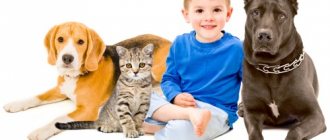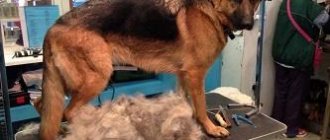Top 10 most common reasons why a dog may whine
Whining as a means of manipulation - animals understand perfectly well how to exploit the owner in their own interests. Thus, domestic dogs often whine, begging for a piece of sausage or wanting to quickly start playing with the owner. And the more often the owner responds to such calls, the more the dog will whine;
Boredom – Dogs can get bored too. And if an animal lies sadly, staring at one point, or wanders around the house idle, whining, then this may be precisely because of boredom;
The desire to satisfy natural needs - often our pets whine when they are hungry or thirsty, want to go to the toilet or, for example, are cold. This is how they give a signal to the owner to help them as soon as possible;
Night sounds during rest - animals also see dreams, not all of which are pleasant and peaceful. Let's say the dog could have dreamed of a pack of angry mongrels chasing him, which led to whining;
Discomfort or fear in the absence of the owner - if a dog whines in the dark at night or raises a voice during the daytime hours when the owner is not in the house, fear and anxiety may be to blame (where could a human friend go, what if he doesn’t come back?);
Whining in unison – often in an apartment building you can hear a whole “choir” of whining dogs. If, for example, on the third floor a dog began to whine because of hunger, then on the fourth floor its tailed brother could easily support it, whining for company;
Submission to the owner or other animals is one of the reasons why a dog whines. It happens that a pet dog that has committed a crime (the owner’s bitten shoes or torn curtains) seems to apologize to the person, showing his respect by whining. Or, on a walk, a young and inexperienced pet may well whine when he sees a seasoned brother on the way;
Hunting instincts - even a lap dog can become excited, for example, at the sight of chirping sparrows in the window or a cunning cat sitting in a tree. The dog understands that the prey seems to be close, but he can’t reach it, which is why he whines with annoyance;
Sexual heat - if the animal runs and whines, does not find a place for itself, then the culprit may be estrus or its imminent onset, if we are talking about a bitch. Males can behave almost as restlessly when they feel a “girlfriend” in heat nearby;
Illness is the most dangerous reason why dogs whine
Here it is important to carefully observe the animal, exactly what kind of whines it whines.
Anxious symptoms associated with whining
- when a dog intensively shakes its head, scratches its ears and whines, this may indicate the presence of some kind of ear disease (for example, otodectosis, otomycosis, otitis media, etc.);
- if your pet whines after eating, there are problems with the gastrointestinal tract (stomach ulcer, gastritis, peritonitis, ascites, oncological processes, etc.);
- in cases where the pet whines when pooping, pathological processes in the intestines (colitis, intestinal obstruction, proctitis, etc.) may be to blame;
- the dog whines when urinating if it has ailments of the genitourinary system (cystitis, urolithiasis, complications after estrus, etc.);
- if, in addition to whining, the animal also has a fever, discharge from the nose and eyes, upset stool, when the dog does not eat, and sometimes does not drink, and suddenly loses weight, then the matter may be a bacterial, viral or fungal infection;
- A dog behaves extremely restlessly when there is a large accumulation of worms inside the body. In these cases, in addition to whining, there will be the following symptoms: diarrhea alternating with constipation, vomiting, cough, weight loss, shortness of breath, deterioration of the skin and coat, itching in the anus;
- If the dog whines and shakes (trembling and convulsions), feels nauseous, has a rapid pulse, saliva flows, breathing becomes shallow, and has diarrhea, then one may suspect poisoning from poisons, medications, or spoiled food.
All the reasons why a dog whines in pain cannot be mentioned.
If the animal is clearly unwell, it is important to take it to the veterinary clinic as soon as possible or call a specialist to your home. In some situations, the time required for healing to take place is literally minutes.
Therefore, you should always pay attention to the symptoms accompanying whining.
How to Calm Your Dog by Creating New Rules
Hyperactivity in a dog can occur because the dog does not feel safe. This happens with dogs whose lives cannot be called cloudless and happy. With those animals that ended up in a shelter and then changed several owners. How to calm the dog in this case?
You should be aware that dogs follow certain routines. They feel much calmer when no surprises happen in their lives, and everything moves in accordance with an established routine. You should create a simple and understandable routine for such a dog. For example:
- Early in the morning the dog should go for a walk. Then breakfast awaits her. Then she will spend several hours alone, when the adults are at work and the children are at school.
- In the afternoon, one of the family members will take the dog out for a walk again and play with it there.
- In the evening the whole family will gather for dinner. The dog will have dinner, and then he will be taken out for a walk again before bed.
Of course, there is no need to adhere to very strict time frames and develop a detailed schedule. You just need to stick to a certain consistency in your dog's daily life.
The dog's behavior changed after the 2nd heat.
Good afternoon. I'm concerned about my dog's behavior. Please help me figure it out. Dog: - girl - 1 year 4 months - Russian Toy Terrier Let's start from the beginning, I got the puppy at 6 months. The puppy was cowardly, she was afraid of dogs on the street and could not get used to me for a long time, I worked with her, taught her to walk and communicate with other animals, gradually the dog began to get used to it, her cowardice disappeared, then she began to go into heat, this was after 2 months. living with me, during her first heat, her behavior changed for the better, she got used to me, calmly gave herself into my hands, at first we had problems with this, it was difficult to pick up the dog from the floor into her arms, she ran to the sofa and only after this could have been taken calmly. In general, after 1 heat, the dog was already accustomed to me, to other animals, behaved well on the street, played with other dogs. The only thing was that the dog did not give in to other people, he only accepted me. Everything was fine, but then the 2nd heat came and immediately after the end of the 2nd heat the dog changed in behavior. In the evenings she starts hiding, she can sit under the closet and if you try to pick her up she starts squeaking, I left her alone after this behavior, she calmed down and went to bed, in the morning everything was fine, in the evening the situation repeats, if you pick her up she will squeak If you let go, she runs and hides. I’ve never hurt a dog, I haven’t screamed, and of course I haven’t raised my hand to her, i.e. For me, this behavior of a dog towards me is strange. The only thing is that I brush my dog’s teeth in the evenings, but she takes brushing calmly, I was already thinking that maybe she is afraid that they will brush her teeth now and is hiding. About 2 weeks after the heat, the dog seemed to be returning to normal, this cowardice in the evenings went away, but today I went for a walk with the dog, everything was fine, the dog was walking, playing with other dogs, running, then I called her, she came up to me, I bent down to stroke her and pick her up, when I stroked her she began to squeak, and when I picked her up she started screaming, she screamed very loudly, I didn’t hurt her, the dog screamed with fear, I tried to calm her down, I calmed her down after 5 minutes, that’s all This time she screamed very loudly, letting her go to the ground, we went home. The dog ran to the house squeaking and looking around, when we arrived home she hid under the closet and sat there for about 15 minutes, then she came out to calmly play with a toy, I went up to her, that’s it It’s fine, he’s no longer afraid. We visited the vet not long ago. doctor, did an ultrasound of the abdominal cavity, took blood tests, a clinical analysis of urine, blood, and feces. According to the tests, everything is fine. My reaction to this behavior of the dog is that I try to calm it down or leave it alone so that it comes to its senses. I feed the dog 2 times a day, morning and evening, NOW Natural holistic food The dog sleeps with me, but on its own bedding We walk 2-3 times a day, walks were normal, until the incident that I described, the dog plays, runs, etc. Duration from 15 minutes to 2 hours per walk, depending on the weather. The dog is obedient both at home and on the street. I am very worried about this behavior of hers, please explain what this could be connected with. I also wanted to add that the dog was not hit, is not injured, when palpated she lies calmly, she begins this behavior before you pick her up. Thank you
Why does an adult dog whine?
Whining is common in adult dogs. This behavior may be associated with health problems, characteristics of upbringing and behavior, and living conditions. If your pet constantly whines even without obvious reasons, you should contact a dog trainer or veterinarian. Below are the main reasons why a dog cries and cannot find a place for himself.
Health problems
If you notice that the animal is trembling and whining pitifully, this may be due to physiological problems. Possible causes and typical manifestations:
- Diseases of the musculoskeletal system. This may be the destruction of joints due to age or pain after an injury. The dog may whine, limp and move poorly. Most often, the dog takes a comfortable position and finds it difficult to get up and walk. In this case, it is recommended to carry the pet only in a horizontal position.
- Pathologies in the oral cavity. Sharp objects and pieces of food often get stuck in the mouth. If you notice that the animal is breathing frequently or making unusual sounds, you should check the condition of the gums and teeth.
- Ear diseases. Ear mites and common otitis media are more common, causing the dog to scratch its ears and whine. A veterinarian examination is required.
- Indigestion. Characteristic features are refusal to feed, changes in behavior after eating, vomiting and diarrhea. It is recommended to undergo a full diagnostic to accurately determine the cause of this problem.
- Infestation with parasites. If you notice that your dog whines when he poops or rides on his butt after defecation, he may be infected with worms. For treatment and prevention, special anthelmintic drugs are prescribed.
Behavior problems
The most common reason why a dog whines is its reaction to living conditions, as well as mental characteristics. Whining is most common in restless and anxious pets when the owner leaves. The main factors triggering atypical behavior:
- the bitch's reaction to being weaned from her puppies, which can last up to several weeks. In this case, the dog hardly sleeps at night, walks around the house and makes various sounds;
- loud noises outside the house - thunderstorms, firecrackers, car alarms and gunshots. The dog runs around the apartment, behaves restlessly and hides in the darkness;
- boredom for the owner when the dog is left alone. A similar reaction can occur when kept in an apartment or in an enclosure;
- whining in dogs is also observed after punishment by their owner for any offense or fault. Usually the dog stops whining after reconciliation if the owner offers a treat.
In addition, the dog may whine after any surgical intervention, for example, after sterilization. In this way, the animal demonstrates discomfort and pain. Often, bitches whine after estrus, which is caused by changes in hormonal levels; normally, this behavior goes away within 1-2 days.
Behavior driven by instincts
Dogs are hunters by nature, and this quality manifests itself to varying degrees in different breeds. If you notice that the dog is thrashing around and whining, then perhaps he has noticed the prey, but cannot catch it. This problem is often observed in dogs that spend a lot of time on the balcony or in an enclosure. Overexcitation from the sight of birds, cats and other animals running nearby can persist even after castration in male dogs.
Psycho-emotional factors
A common reason why a dog whines. In this way, animals express their emotions, reactions to the owner and external factors. It could be joy, excitement, fear or worry. Whining can be triggered by various reasons:
- the appearance of a child or a new animal in the house;
- boredom of the owner when they are left alone all day;
- reaction to returning after a walk;
- dreams (when a dog whines in his sleep).
If the dog is shaking with excitement and cannot calm down for a long time, you need to offer it a treat, pat it a little at the withers or stroke it behind the ears. Some dogs begin to be cunning - they whine to beg for food or a walk. For example, a dog sits on its hind legs and looks straight into the eyes, making various sounds. This behavior should be stopped by expressing dissatisfaction and reprimanding your pet.
In what situations can a pet whine?
If a dog whines in a certain situation, remember this. Methods for correcting behavior will depend on irritating factors.
In a dream
Whining in sleep is associated with nightmares. Four-legged pets also have bad dreams, and some of them are very afraid of the dark.
During the trip
Whining before a trip is usually associated with motion sickness or fear of confined spaces. In the first case, the problem is solved by taking pills, and in the second, by gradually getting used to transport.
During heat
Females whine not only before estrus, but also after it occurs. In this way they invite partners to mate. Here you can do without correction, since after the end of the heat the problem resolves on its own.
After meal
In such a situation, it is recommended to check the pet for pathologies of the digestive tract. He may whine in pain due to overeating, hunger and more serious disorders. If no health problems are found during the diagnosis, think about manipulation. Most likely, the cunning dog is simply pressing on your pity, trying to beg for another piece of sausage after a hearty lunch.
At certain sounds
Unlike humans, dogs have very developed hearing. They pick up very quiet sounds that are inaccessible to our ears. They may be disturbed by too loud music, a crying child, a doorbell or intercom, an extraneous knock, a squeaking toy, the subtle chirping of birds or the meowing of a cat.
With a toy
Squeaking toys cause irritation or delight in a four-legged animal. In both cases, he may whine, imitating the sound.
If whining accompanies false pregnancy, then in this way the pet is trying to communicate with her imaginary cubs. She mistakes toys brought to the “nest” for them.
Useful videos
What to do if your dog is sad:
If your dog is afraid to ride in a car:
An important task for any owner of a four-legged friend is to understand and find the reason for the dog’s whining. Among the possible ones are illness, fear, joy, inappropriate sound vibrations, happiness or negativity when meeting a person. After an accurate determination, you need to help your friend, be patient and not scold your pet. Otherwise, you may lose the animal’s sincere love and trust.
If your pet is too active and emotional, then this can become a real problem for all family members, especially if the dog expresses its emotions by whining. What are the reasons for this behavior? And how to wean your pet from this habit?
Physical need
If your dog suddenly starts whining for no apparent reason, the first thing to rule out is pain or any other type of physical disorder. This is especially true for a dog who whines while lying in a very submissive position without trying to attract you in any other way.
If this happens suddenly, consult your veterinarian first to rule out pain or internal discomfort.
Another physical demand that dogs may express through whining is the need to fulfill physiological needs, especially if they are being house trained. As the urge to urinate or defecate arises, it conflicts with their innate instinct not to enter their den for these purposes. This is a very specific form of the disorder that may be associated with your dog scratching the door or nudging you with his muzzle.
Stimuli and irritants
Quite often, dog owners are faced with the problem of whining when the pet notices any irritant. Most of the trip is calm, but as soon as the pet sees another dog or cat, he begins to whine and howl. Over time, the excitement does not go away, but only increases, which leads to the development of a hysterical state.
Stimulants for excessive arousal may include:
- Other animals.
- Cyclists and motorcyclists.
- Smells.
- Sounds. • Weather conditions – thunderstorm, heavy snowfall, hail.
If a dog is very worried when reacting to stimuli, the owner should think about his level of socialization. As a rule, well-socialized animals calm down within 1–3 minutes, after the stimulus is removed from sight.
Choleric dogs also tend to fall into a state of hysterical excitement. The reason for whining in this case is a feeling of novelty.
Quite often, dogs react sharply to stimuli if they lack physical activity. Simply put, when you see a dog on the street, your pet begins to be jealous and indignant because it has not been walked for a long time.
Physical need
If your dog suddenly starts whining for no apparent reason
, the first thing to rule out is pain or any other type of physical disorder. This is especially true for a dog who whines while lying in a very submissive position without trying to attract you in any other way.
If this happens suddenly, consult your veterinarian first to rule out pain or internal discomfort.
Another physical demand that dogs may express through whining is the need to fulfill physiological needs, especially if they are being house trained. As the urge to urinate or defecate arises, it conflicts with their innate instinct not to enter their den for these purposes. This is a very specific form of the disorder that may be associated with your dog scratching the door or nudging you with his muzzle.
Metal state
In a pack of wolves, howling means submission. Wild animals are accustomed to fighting and obeying leaders. So, a defeated wolf may begin to whine and lower his head when he has lost the fight. In our case, the dog may howl because he feels guilty. In this case, you should not shout at him or show emotions. You need to silently approve of his whining and leave. Thus, the dog will think that the “apology” has been accepted and he has been forgiven.
Also, whining can mean delight. Often, they whine when the owner returns home. Often, the howl is accompanied by barking, jumping and wagging of the tail. In such a case, restraint must be exercised. It’s better to wait until the dog stops whining and only then pet him and talk to him
Then he will understand that whining does not attract your attention.
In this case, you should not provoke your pet. You need to wait until he stops whining and only then decide whether to fulfill his desire or not.
Other measures
There are several ways to keep your dog quiet in your absence that I find unacceptable.
- It happens that dogs have their vocal cords cut. Besides the fact that it interferes with the 4th of the “five freedoms”, the hoarse sounds that dogs nevertheless make after this operation will make the owner feel guilty for many years...
- Electroshock anti-barking without the exercises described above will only increase the dog’s fear of loneliness. Often she will continue to howl without a collar, and while wearing a collar she will begin to spoil things, dirty the house, or develop some other bad habit. In addition, the use of electroshock anti-bark is inhumane and violates the animal’s right to 5 freedoms.
- Ultrasonic anti-bark (stationary and collar) can replace your punishment at the 8th stage of behavior correction. Without preliminary exercises, the dog will get used to the ultrasound and stop responding to it after about 2 weeks.
How to stop a dog from whining?
What to do if your pet whines? Once the reason for this behavior is determined, you can look for ways to solve the problem. First, let's talk about the smallest pets, which often cause discomfort and prevent newly acquired owners from sleeping. To keep the puppy calm, you need to prepare a bed for him or his own house. At first, he should not be left alone in the house for a long time. You cannot lock your baby in a cage or the next room, he will feel abandoned and unhappy. The dog should not get additional stress; if possible, you should protect him from any negative emotions.
New owners need to remember that the adaptation period should be as calm as possible. Babies less than 1 month old should not be separated from their mother. However, if this is exactly what happened, the dog bed should always be near the owner, so that at any time when the puppy begins to worry, he can stroke and caress him. Over time, the bed moves further and further, and less attention should be paid to whining than in the first days. Things that still have the smell of their previous habitat will also help.
When the baby grows up, he should stop crying at night. If this does not happen even after an adaptation period, it makes sense to turn on a night light or lamp in the dark. You need to talk to your dog in a gentle, soothing voice. To prevent her from getting bored, her favorite toys should be nearby.
Now let's talk about adult dogs. It is also possible to wean them from whining, but in different cases the measures of influence should differ. For example, if an animal requires attention, you need to try to devote more time to it. You can arrange joint games and walks in the fresh air. However, the main thing in this matter is to observe moderation, otherwise the pet may understand that its actions cause a response and begin to manipulate its owner. If whining is to attract attention to the fact that it is time for the dog to relieve itself, you need to take it outside and then try to do it in a timely manner. It wouldn’t hurt to show that the owner doesn’t like the dog’s behavior. To do this, you need to talk to him strictly. However, this only applies if there are no serious reasons for whining.
If the owner is busy and often leaves the pet alone, additional work needs to be done with the dog so that it does not feel unnecessary. At first, you should only leave the room, making it clear that you are on the territory of the house. Then you can start hiding, doing this for an increasingly longer time. The main thing is not to react to the emotions that your pet shows. Walking and spending time together will only be beneficial. During them, the dog will splash out energy and communicate with its relatives.
If the animal has experienced a stressful situation, it is necessary to create a calm and comfortable environment in the house. In case of illness, you should immediately see a specialist. When a dog whines, begging for a treat or some other thing, you cannot follow his lead. Ideally, the request is fulfilled only when he has completely calmed down. It will be very useful to accustom the dog to a certain regime, then walks, meals and other entertainment will be carried out only at specially designated times. The animal will get used to it and will not demand what it wants when it wants it.
To learn how to stop a puppy from whining when he is left alone at home, watch the following video.
The dog whines in his sleep and at night
There are several theories as to why dogs whine in their sleep. The main reason is a vivid dream that causes an emotional outburst and manifests itself in the form of whining in reality. It is impossible to determine whether an animal is having a good or a bad dream, but they, like people, have dreams. This phenomenon is completely normal and should not cause concern.
Perhaps the pet experiences anxiety when the owner is not around, which is why the dog whines at night. If this behavior occurs repeatedly, it is advisable to move the dog bed into the bedroom and place it next to your bed. This measure is temporary. After some time, the bed needs to be moved a short distance towards the bedroom door, and then to the permanent location of the animal’s sleeping place. Additional activities include long walks and a hearty dinner.
Then the animal will sleep soundly and not make attention-grabbing sounds
The dog wants to defend himself
After trampling, the dog goes to sleep, most often curled up in a ball. This position ensures that the animal remains warm and safe. An animal sleeping in a cavity is more difficult for enemies to notice, and, in addition, the most vulnerable places on its body - the throat and stomach - are protected.
Maintaining the ball position on a flat surface is tiring; you have to constantly strain your muscles. A depression made in the ground or snow helps to relax, as the walls of the den support the back and serve as support for the body.
A healthy four-legged pet, after twirling and trampling, calms down and falls into a light “dog” sleep. The instinct of a guard and hunter will not allow the animal to sleep soundly - hearing and smell continue to work.
What to do if your dog whines at night
As a rule, adult dogs sleep at night if their day has been eventful and active, the pet is well-fed and healthy. Therefore, most often small puppies make cutting, unpleasant sounds at night, and this is most often explained not only by a sharp change in their usual environment, but also by fear and loneliness.
During the first few days, whining is quite normal. He is frightened by new surroundings, smells, sounds. Some dog breeders recommend taking your pet to the bed. But dog experts do not recommend doing this. The puppy will get used to sleeping with you and it will be difficult to accustom an older pet to a place.
To stop your puppy from whining:
Organize a comfortable bed or house for the new member of your family.
If possible, do not leave the dog alone for a long time, and especially do not lock the puppy in a crate or in another room.
Protect your dog from stress and negative emotions. The period of adaptation and socialization should be as calm and favorable as possible.
If the puppy is a little over a month old, at this age it is not advisable to separate him from his mother. But if this happens, place the dog bed near your bed and as soon as the baby whines, calm him down and pet him. Once the puppy calms down, praise him.
Gradually move the lounger further away from the bed and react less to whining. Pay more attention to the pet so that it quickly gets used to its new home and can more easily endure separation from its mother. To help the puppy better tolerate separation from its mother-dog, ask the breeders for toys, a cloth, and things that retain familiar smells. Place them near the bed or in the house where your small pet sleeps, and he will behave more confidently and calmly. You can also use a heating pad or a bottle filled with warm water. Wrap it in soft cloth and place it near the puppy.
If the puppy, having adapted to new conditions, continues to howl and whine at night, leave the light or night lamp on. Approach the dog and calm it down in a gentle tone. If the whining does not stop, perhaps the puppy does not want to sleep and is bored. Place toys and tooth sharpeners near the baby. After playing enough, the dog will get tired and sleep peacefully.
Gradually accustom your dog to the command “Place”, “Fu”, “No” or any other prohibition commands. Give the command in a strict tone, and as soon as the dog has shown obedience, reward it with a gentle intonation or a treat. To prevent the puppy from getting bored when you are not at home, leave him various toys. Otherwise, the dog will not only howl, but will also begin to damage furniture and wallpaper.
Physical activity is equally important. After quarantine, walk your dog several times a day, gradually increasing the walking time. Accustom your puppy to communicate with his relatives, so that he then reacts normally to other dogs and animals.
Peculiarities
According to the veterinarian, it is very important to distinguish between normal bed scratching and attempting to dig at the bed. Sometimes this behavior can mean different things, for example, the bitch is pregnant. In fact, nesting is part of an ingrained maternal instinct, as mothers naturally want to create a safe, protected place for their newborns. This will involve moving the bed (and even various materials such as blankets or soft linens) to a more distant location, as well as extensive scratching.
What to do if your dog whines at night
As a rule, adult dogs sleep at night if their day has been eventful and active, the pet is well-fed and healthy. Therefore, most often small puppies make cutting, unpleasant sounds at night, and this is most often explained not only by a sharp change in their usual environment, but also by fear and loneliness.
During the first few days, whining is quite normal. He is frightened by new surroundings, smells, sounds. Some dog breeders recommend taking your pet to the bed. But dog experts do not recommend doing this. The puppy will get used to sleeping with you and it will be difficult to accustom an older pet to a place.
To stop your puppy from whining:
Organize a comfortable bed or house for the new member of your family.
If possible, do not leave the dog alone for a long time, and especially do not lock the puppy in a crate or in another room.
Protect your dog from stress and negative emotions. The period of adaptation and socialization should be as calm and favorable as possible.
If the puppy is a little over a month old, at this age it is not advisable to separate him from his mother. But if this happens, place the dog bed near your bed and as soon as the baby whines, calm him down and pet him. Once the puppy calms down, praise him.
Gradually move the lounger further away from the bed and react less to whining. Pay more attention to your pet so that he quickly gets used to his new home and can more easily endure separation from his mother. To help the puppy better tolerate separation from his mother-dog, ask the breeders for toys, a cloth, things that have retained familiar smells. Place them near the bed or in the house where your small pet sleeps, and he will behave more confidently and calmly. You can also use a heating pad or a bottle filled with warm water. Wrap it in soft cloth and place it near the puppy.
If the puppy, having adapted to new conditions, continues to howl and whine at night, leave the light or night lamp on. Approach the dog and calm it down in a gentle tone. If the whining does not stop, perhaps the puppy does not want to sleep and is bored. Place toys and tooth sharpeners near the baby. After playing enough, the dog will get tired and sleep peacefully.
Gradually accustom the dog to the command "", "Fu", "" or any other prohibition commands. Give the command in a strict tone, and as soon as the dog has shown obedience, reward it with a gentle intonation or a treat. To prevent the puppy from getting bored when you are not at home, leave him various toys. Otherwise, the dog will not only howl, but will also begin to damage furniture and wallpaper.
Physical activity is equally important. After quarantine, walk your dog several times a day, gradually increasing the walking time. Accustom your puppy to communicate with his relatives, so that he then reacts normally to other dogs and animals.









